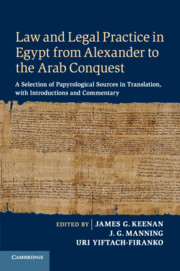 Law and Legal Practice in Egypt from Alexander to the Arab Conquest
Law and Legal Practice in Egypt from Alexander to the Arab Conquest Book contents
- Frontmatter
- Dedication
- Contents
- List of figures
- List of contributors
- Preface
- Calendars
- List of abbreviations
- Maps
- Chapter 1 Introduction and historical framework
- Chapter 2 The historical development of the form, content, and administration of legal documents
- Chapter 3 The languages of law
- Chapter 4 The family
- Chapter 5 Capital
- Chapter 6 Sale
- Chapter 7 Leases
- Chapter 8 Labor
- Chapter 9 Slavery in Greco-Roman Egypt
- Chapter 10 The judicial system in theory and practice
- Concordance
- Suggested reading for introductions to papyrology in English
- Glossary of technical terms
- Works cited
Chapter 7 - Leases
Published online by Cambridge University Press: 05 May 2014
- Frontmatter
- Dedication
- Contents
- List of figures
- List of contributors
- Preface
- Calendars
- List of abbreviations
- Maps
- Chapter 1 Introduction and historical framework
- Chapter 2 The historical development of the form, content, and administration of legal documents
- Chapter 3 The languages of law
- Chapter 4 The family
- Chapter 5 Capital
- Chapter 6 Sale
- Chapter 7 Leases
- Chapter 8 Labor
- Chapter 9 Slavery in Greco-Roman Egypt
- Chapter 10 The judicial system in theory and practice
- Concordance
- Suggested reading for introductions to papyrology in English
- Glossary of technical terms
- Works cited
Summary
Introduction
Leasing, in particular the leasing of land, is one of the best-attested private legal transactions in the papyrological evidence, abundantly attested across the boundaries of regions, periods, and languages of Egypt. While a large proportion of merely oral lease arrangements must always be taken into account (Mrsich 1994, Eyre 2004), there seems to have been a steady movement from oral to written agreements from the earliest attested lease-like documents of Egypt, cursive Hieratic and early Demotic texts of the seventh and sixth centuries bc, up to the Byzantine period, when the proportion of leases among the total of papyrus documents grew higher than ever before (Jördens 1999).
To date, about fifteen hundred Greek leases from the early third century bc to ad 708, the year of the latest datable Greek lease document, P.Apoll. 57, have been published. Among them are 450 documents from the Byzantine period. During the first century after the Arab conquest, the number of Greek lease documents dropped sharply; but in Coptic, which was gaining importance as a language of legal documents at that time, some sixty leases and about forty rent receipts are attested. These bear evidence of a certain continuity in agricultural work and its administration, at least on the local level. Land leases written in Arabic start with a document dated to ad 776. The sixty-two extant Arabic leases and 132 land-tax receipts from the later eighth to the mid-eleventh century, only recently studied in detail, differ greatly in form, content, and style from Byzantine leases. They bear witness to considerable alterations of crucial economic and legal concepts and to the transformation of a mainly private economy, an agricultural “capitalism” avant la lettre, to a rather state-dominated system of agricultural administration.
- Type
- Chapter
- Information
- Law and Legal Practice in Egypt from Alexander to the Arab ConquestA Selection of Papyrological Sources in Translation, with Introductions and Commentary, pp. 339 - 400Publisher: Cambridge University PressPrint publication year: 2014


